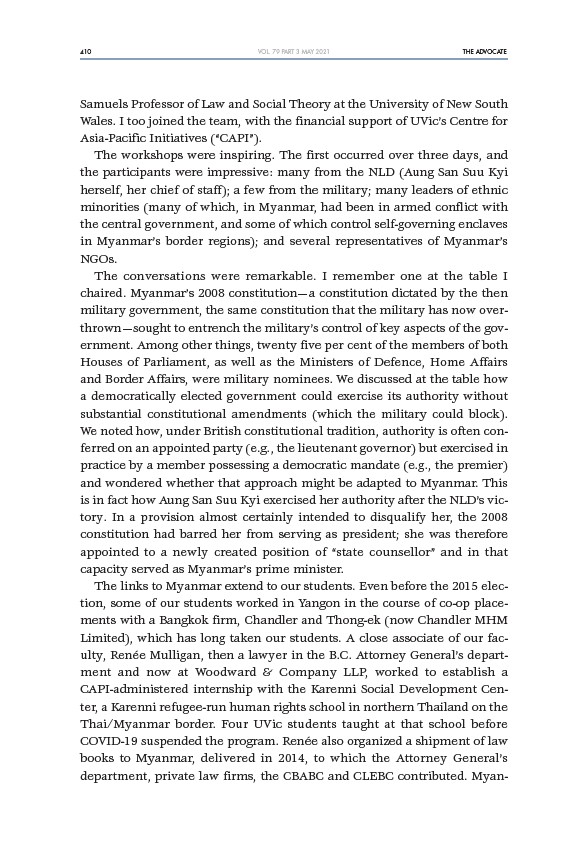
410 THE ADVOCATE
VOL. 79 PART 3 MAY 2021
Samuels Professor of Law and Social Theory at the University of New South
Wales. I too joined the team, with the financial support of UVic’s Centre for
Asia-Pacific Initiatives (“CAPI”).
The workshops were inspiring. The first occurred over three days, and
the participants were impressive: many from the NLD (Aung San Suu Kyi
herself, her chief of staff); a few from the military; many leaders of ethnic
minorities (many of which, in Myanmar, had been in armed conflict with
the central government, and some of which control self-governing enclaves
in Myanmar’s border regions); and several representatives of Myanmar’s
NGOs.
The conversations were remarkable. I remember one at the table I
chaired. Myanmar’s 2008 constitution—a constitution dictated by the then
military government, the same constitution that the military has now overthrown—
sought to entrench the military’s control of key aspects of the government.
Among other things, twenty five per cent of the members of both
Houses of Parliament, as well as the Ministers of Defence, Home Affairs
and Border Affairs, were military nominees. We discussed at the table how
a democratically elected government could exercise its authority without
substantial constitutional amendments (which the military could block).
We noted how, under British constitutional tradition, authority is often conferred
on an appointed party (e.g., the lieutenant governor) but exercised in
practice by a member possessing a democratic mandate (e.g., the premier)
and wondered whether that approach might be adapted to Myanmar. This
is in fact how Aung San Suu Kyi exercised her authority after the NLD’s victory.
In a provision almost certainly intended to disqualify her, the 2008
constitution had barred her from serving as president; she was therefore
appointed to a newly created position of “state counsellor” and in that
capacity served as Myanmar’s prime minister.
The links to Myanmar extend to our students. Even before the 2015 election,
some of our students worked in Yangon in the course of co-op placements
with a Bangkok firm, Chandler and Thong-ek (now Chandler MHM
Limited), which has long taken our students. A close associate of our faculty,
Renée Mulligan, then a lawyer in the B.C. Attorney General’s department
and now at Woodward & Company LLP, worked to establish a
CAPI-administered internship with the Karenni Social Development Center,
a Karenni refugee-run human rights school in northern Thailand on the
Thai/Myanmar border. Four UVic students taught at that school before
COVID-19 suspended the program. Renée also organized a shipment of law
books to Myanmar, delivered in 2014, to which the Attorney General’s
department, private law firms, the CBABC and CLEBC contributed. Myan-